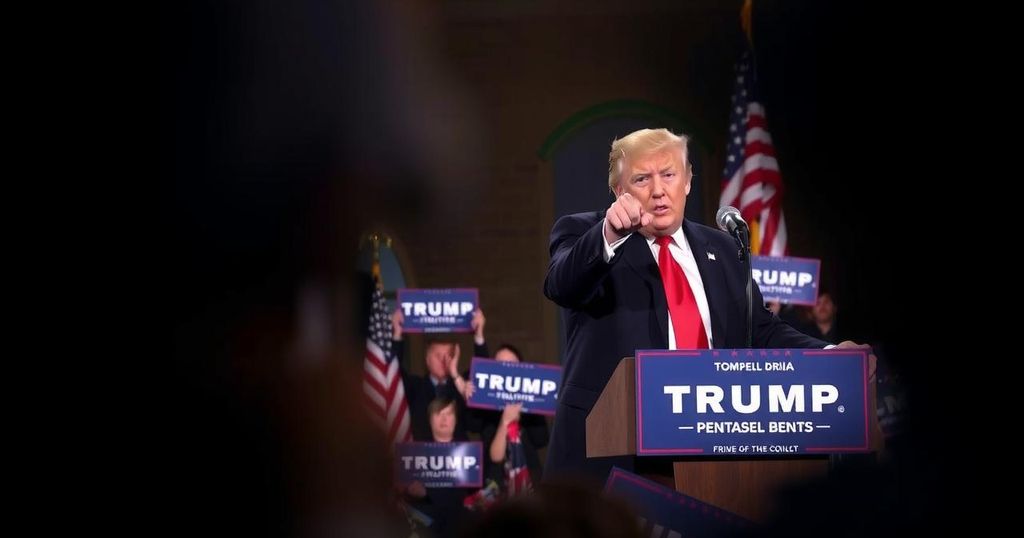Trump Intensifies Misinformation Campaign in Pennsylvania Election Push

Former President Trump is intensifying claims of election fraud in Pennsylvania, asserting without evidence that the state’s voting process is compromised. Local officials dispute his allegations, affirming the integrity of their election security systems. The spread of misinformation about voting procedures has been prevalent, with social media playing a significant role in amplifying these unfounded claims. Amidst these challenges, experts urge vigilance in maintaining electoral integrity and addressing baseless accusations that undermine public trust.
In the lead-up to the pivotal election day, former President Trump is intensifying his efforts to cast doubt upon the integrity of the voting process in Pennsylvania, a key battleground state. At a recent rally in Allentown, he claimed, “They’ve already started cheating!” as official responses address the influx of misinformation proliferating on social media. For several months, Trump has laid the groundwork for challenging the election results should he not succeed. His unfounded allegations state that Pennsylvania’s voting process is compromised, with sweeping claims being made regarding purported election fraud. For example, he asserted on Truth Social that Lancaster County was implicated in a scandal involving 2,600 “fake ballots and forms, all written by the same person.” However, local election officials clarified that they had uncovered approximately 2,500 suspicious voter registration applications, indicating that their election security measures are functioning correctly. Further adding to the narrative, Trump alleged that York County had been inundated with “thousands of potentially fraudulent” voter registrations based on their review of about 3,000 applications. Yet, the officials were simply engaged in due diligence to ensure the integrity of the election process. The environment in Pennsylvania has been described as a hub of election denial trends, leading to significant misinformation challenges. As stated by Kyle Miller, a Pennsylvania policy strategist at Protect Democracy, this phenomenon is concerning. Former Secretary of the Commonwealth, Kathy Boockvar, emphasized that these investigations illustrate the efficacy of the safeguards in place within the voter registration framework, asserting, “This is a sign that the built-in safeguards in our voter registration process are working.” Social media platforms, particularly X, have become breeding grounds for amplifying election-related misinformation, with prominent figures, including Trump ally Elon Musk, exacerbating the situation. Events portrayed as voter suppression, such as the handcuffing of a woman at a polling site, were inaccurately represented. Local authorities clarified that the woman was removed for disruptive behavior rather than for any form of voter suppression. Legally, the Trump campaign’s efforts have been met with mixed results, successfully securing an extension for mail ballot acceptance, yet the overarching narrative remains one of sowing discord and doubt within the electoral framework. The complexities of Pennsylvania’s election process, with 67 counties running their respective operations, further complicate communication surrounding voting practices and deepen the potential for misunderstandings. The situation is not solely contained within Pennsylvania, as similar misinformation accusations have been witnessed in other battleground states, highlighting a wider trend of disinformation across the nation. Amidst this chaos, Boockvar posits that while no electoral process is flawless, the propagation of conspiracy theories and misinformation is alarmingly pervasive this election cycle.
The article discusses the heightened efforts by former President Trump to undermine confidence in the electoral process in Pennsylvania during the crucial election period. It highlights the context of false allegations, local official responses, and the broader issue of misinformation in the political landscape. The challenges faced by election officials in combating misleading information, particularly in a state noted for election denialism, are also examined, situating the claims made by Trump within a larger national trend of misinformation surrounding elections.
In conclusion, the discourse surrounding the Pennsylvania election encapsulates broader themes of misinformation and election integrity. Trump’s unfounded assertions and the subsequent local investigations underscore ongoing tensions related to electoral processes, reflecting a national pattern of doubts being cast on democratic procedures. Effective communication and a commitment to transparency will be crucial in ensuring public confidence in electoral outcomes moving forward.
Original Source: www.axios.com







